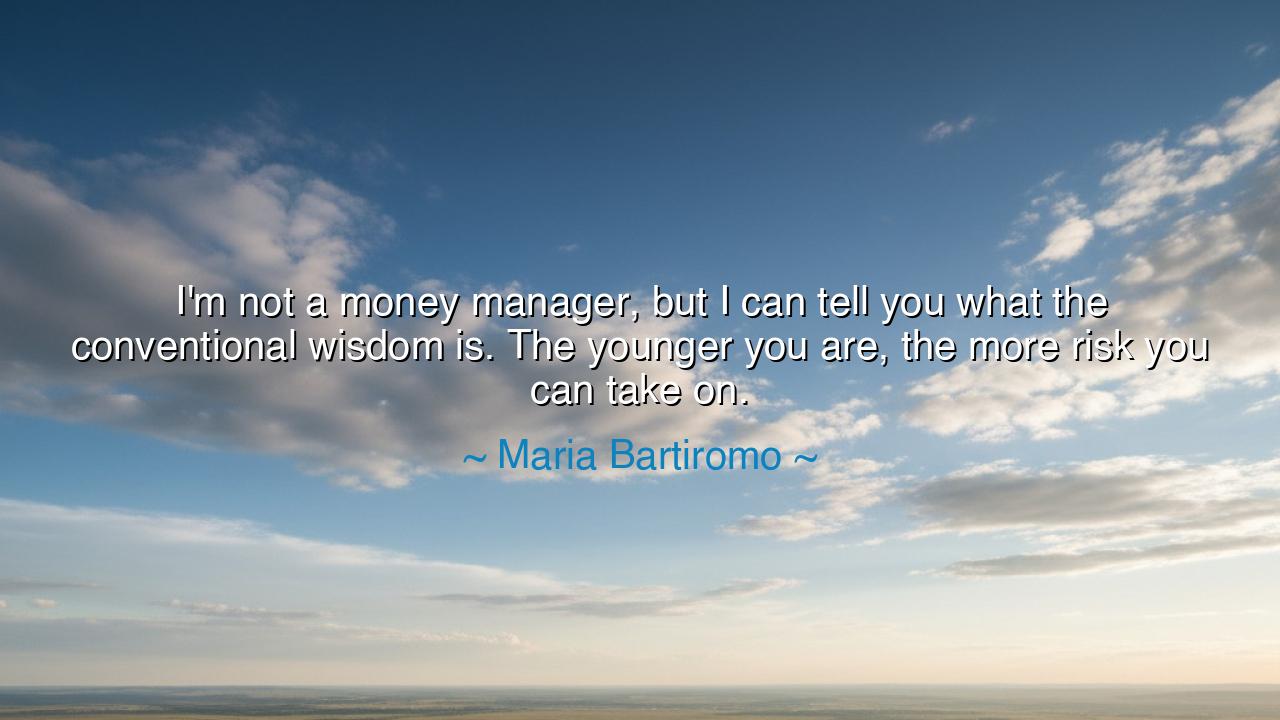
I'm not a money manager, but I can tell you what the
I'm not a money manager, but I can tell you what the conventional wisdom is. The younger you are, the more risk you can take on.






Hearken, children of the ages, to the worldly counsel of Maria Bartiromo, who spoke: “I'm not a money manager, but I can tell you what the conventional wisdom is. The younger you are, the more risk you can take on.” In these words lies the enduring truth of youth, opportunity, and prudence. The vigor of the young, unburdened by the weight of accumulated responsibilities, grants a rare freedom: the ability to embrace risk, to venture boldly into the unknown, and to learn from the trials that shape the soul and fortune alike.
Bartiromo teaches that age and circumstance dictate the measure of daring. Youth is the season in which errors cost less in comfort and consequence, and in which the horizon of possibility stretches wide and unencumbered. Conventional wisdom recognizes that the boldness of early years, tempered by guidance and reflection, can yield extraordinary returns in both wealth and understanding. The lesson is clear: courage aligned with prudence at a young age lays the foundation for enduring stability in later life.
Consider the tale of Alexander the Great, who, in the bloom of youth, undertook campaigns across lands unknown to his forebears. His audacity, matched with strategy and insight, transformed kingdoms and left a legacy eternal. Though many would caution the young to temper ambition, Alexander exemplifies the principle that youthful courage, when harnessed wisely, can achieve feats beyond the reach of those more cautious in age. Bartiromo’s observation mirrors this wisdom: risk, when measured by youth and guided by prudence, is a tool of growth and triumph.
The ancients themselves recognized the unique potency of youth. Philosophers and sages, from Plato to Confucius, acknowledged that the young, unshackled by the burdens of life’s accumulations, possess a readiness to explore, to question, and to act. Yet they also cautioned that this vigor must be directed by wisdom, lest impetuosity lead to ruin. Bartiromo’s words echo this ancient counsel: the liberty to take risks is a gift, but it is one that must be navigated with insight.
Thus, her teaching is both guidance and admonition: embrace the opportunities of youth, yet temper boldness with reflection. Take on risks that expand your experience, cultivate discernment, and prepare for the seasons in which caution becomes the ally of longevity. In the proper balance of daring and prudence lies the path to both growth and enduring prosperity.
Carry this teaching, children of generations yet to rise: honor the vigor of youth, venture into the unknown with courage, and learn from every trial. For it is in the measured embrace of risk in early life that one cultivates the foundations of wisdom, resilience, and lasting achievement, ensuring that the years to come are built upon the gains of daring and discernment.






BPTran Phan Bich Phung
This sounds like classic investment advice, but it makes me question how much ‘risk’ people should actually take. If you’re young and the market crashes, yes, you have time to recover — but only if you don’t panic and sell. Isn’t psychological tolerance as important as financial theory? Maybe the real key isn’t just taking risk when you’re young, but understanding what kind of risk you’re truly comfortable with.
HGHuong Giang
I like how straightforward this statement is, but it also exposes a flaw in traditional financial thinking — that risk and age are directly correlated. What about those who start late in life but have strong financial literacy and stable income? Isn’t smart investing more about knowledge, discipline, and goals than just years ahead of retirement? I think personal context matters far more than general rules.
MQNguyen Minh Quyet
This quote raises an interesting question about how financial advice gets generalized. The idea that youth equals risk capacity seems logical, but it assumes everyone starts investing early or even has disposable income to risk. In reality, economic inequality often limits opportunities for young investors. Should conventional financial wisdom evolve to reflect the realities of today’s generation rather than rely on old formulas?
AH14-Pham Thi Anh Hong
I’ve heard this saying countless times, and it makes sense in theory — time allows compounding to work in your favor. But what if someone is naturally risk-averse, even when young? Is it wise to force aggressive investing strategies just because of age? Emotional resilience plays a huge role in financial decisions too, and not everyone can stomach big losses early in life.
PTPhuong Phung thanh
This advice seems practical, but I wonder if it still holds true in today’s volatile markets. Young people might have more time to recover from losses, but they’re also facing record student debt and high living costs. Shouldn’t risk tolerance depend more on financial stability and mindset rather than just age? Maybe the conventional wisdom oversimplifies a much more complex reality.